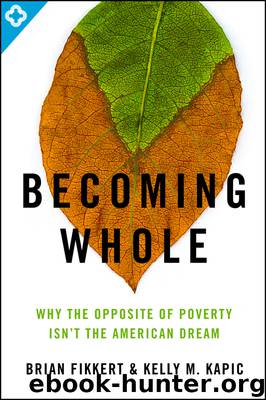Becoming Whole by Brian Fikkert

Author:Brian Fikkert [Fikkert, Brian; Kapic, Kelly M.]
Language: eng
Format: epub
Publisher: Moody Publishers
Published: 2019-05-15T00:00:00+00:00
The Effects of the Fall on Individual Personhood
Recall that human beings are hardwired for intimate relationship with God in the garden-temple of Eden, the very dwelling place of God. Indeed, working, resting, and playing in God’s presence is as central to the human creature as are this creature’s lungs and kidneys. Hence, a right relationship with the Creator God isn’t an optional luxury: it’s central to humanness.
In this light, when Adam and Eve are cast out of the garden-temple, it’s not just that their mailing address has changed. On the contrary, their very personhood is affected: sin now necessarily reverberates through their entire being, damaging their minds, affections, wills, bodies, and relationships. This is far more than a legal problem, as important as that is. It’s a human flourishing problem: Adam and Eve simply lose the ability to fully experience and enjoy humanness. We still have minds, affections, wills, bodies, and relationships, but each of these has been tainted by the intrusion of sin into the world in general and into our lives in particular. Shalom—the original peace, wholeness, and goodness of God’s good creation—has been compromised and distorted. Consequently, none of us fully live and function as intended, and this distorts every aspect of our lives.
Genesis 3 records this dehumanizing process. Adam and Eve’s failure to trust God’s word causes their relationship with God to degenerate from one of deep intimacy to one of fear and alienation. The consequences ripple through their entire personhood: their relationship with self is marred, as they develop a sense of shame about their humanness and cover their nakedness; their relationship with others is strained, as Adam blames Eve for their sin; and their relationship with the rest of creation is distorted, as God curses the environment (see also Rom. 8:18–22). And the damage is not limited to their relationships, as the effects of the fall distort human beings’ minds, affections, wills, and bodies (Ps. 32:1–5; 38; Rom. 1:18–32).9 Yes, the fall gives us a legal problem, but it also gives us a human being-ness problem, for it impacts every square inch of our personhood.
We can use the wheel analogy to illustrate the effects that being banished from the garden-temple had on Adam and Eve. As pictured in Figure 7.1, being cast away from God’s life-giving presence is like removing the top spoke from the wheel. As the wheel goes down the road, the missing spoke puts pressure on the other three spokes to hold the wheel together. They can’t function properly, and they start to bend and break, damaging the hub as well. Over time, the entire wheel, the whole person, starts to cave in on itself, resulting in a highly deformed mind-affections-will-body-relational creature. For some of us, this deformation expresses itself in physical pain or mental illness. For others, it contributes to sexual promiscuity. For still others, it leads to consumeristic behaviors. And for some, it contributes to material poverty. We all are relationally poor. Our relational poverty just expresses itself in different ways.
Download
This site does not store any files on its server. We only index and link to content provided by other sites. Please contact the content providers to delete copyright contents if any and email us, we'll remove relevant links or contents immediately.
| Adult Ministry | Children's Ministry |
| Counseling & Recovery | Discipleship |
| Evangelism | Missions & Missionary Work |
| Preaching | Sermons |
| Youth Ministry |
The Rape Of Nanking by Iris Chang(2325)
The Secret Power of Speaking God's Word by Joyce Meyer(2253)
Chosen by God by R. C. Sproul(1760)
Crash the Chatterbox by Steven Furtick(1655)
Knowing God by J.I. Packer(1431)
Habits of Grace by David Mathis(1422)
How To Be Born Again by Billy Graham(1404)
A Prophet with Honor by William C. Martin(1373)
Peace with God by Billy Graham(1318)
God's Smuggler by Brother Andrew(1218)
Confronting Christianity by Rebecca McLaughlin(1193)
Whisper by Mark Batterson(1156)
Angel Dreams by Virtue Doreen Virtue Melissa(1140)
Missionaries by Norman Lewis(1135)
The Truth War by John MacArthur(1106)
The School of Biblical Evangelism by Ray Comfort(1100)
The Poems of Rowan Williams by Rowan Williams(1072)
Do Greater Things by Robby Dawkins(1046)
Eucharistic Miracles by Cruz Joan Carroll(1017)
